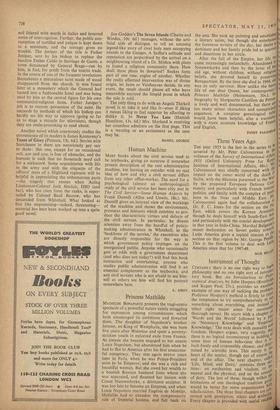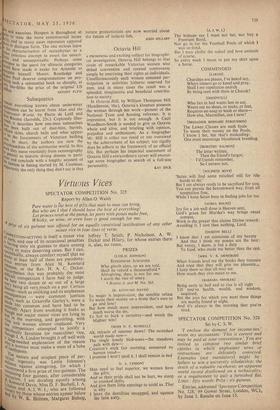Instrument of Thought CERTAINLY there is no One right way
to begin, philosophy and no one right sort of intro". 10. book, But An Introduction to Phil°' sophical Analysis, by John Hospers (Routiedge and Kegan Paul, 25s.), provides an excellent example of one way of tackling the proble° Professor Hospers's method is firmly to fej1 the temptation to try comprehensively (0 5°7
A I 0
something about everything, and insteau select eight major areas for reasoblY na il
thorough survey. He starts with a chapter
nnir 'Words and the World' followed by 111 .Emp on 'Necessary Knowledge' and rii Knowledge.' The next deals with causalitY 31n, freedom. Hospers argues, very cogently, IV' '. of there is no logical inconsistency in holding some item of human •behaviour that it is: both freely and responsibly chosen; and !jeter mined by scientific laws. This surely IS heart of the matter, though not of cow's°I el d 114 end of the affair. The next chapter, ca, 'Life, Mind, and Deity,' contains three sec' tions : on mechanism and vitalism. On tile mental and the physical, and on the CO of deity. The last of these, though within A limitations of one theological tradition would be better for some acquaintance s" scholasticism. The three final chapters are ccr cerned with perception, ethics and iesthe!ic5' Every chapter is Provided with useful re5di/11 1.3 and exercises. Hospers is throughout at ,d ail,.11,3 50 state the more controversial issues ;e"Y. and in many cases represents opposed s3 in dialogue form. The one serious lapse Nth"le elljtracterisation of metaphysics as a riabier Pointless attempt to assert the unveil- It( Le and unsupportable. Perhaps some he,,i'Pee to the quest for ultimate categories have made it easier for Aristotle to K`e°,..gnise himself. Messrs. Routledge and er Paul deserve congratulations on pro- NI °I such a substantial book so cheaply, at eniliY two-fifths the price of the original US on,
ANTONY FLEW











































 Previous page
Previous page